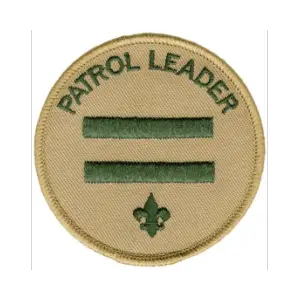The Patrol Leader position in Scouts BSA is a crucial role that plays a significant part in the success of the troop. Patrol Leaders are responsible for leading their patrol, consisting of five to eight scouts, and working with other leaders to ensure that the patrol and the troop run smoothly. They have several responsibilities, including leading their patrol in all troop activities, keeping their patrol organized and motivated, communicating with other leaders and scouts, ensuring their patrol follows the Scout Oath and Law, helping patrol members develop their skills, and assisting troop leaders in planning and running meetings and activities.

To be a successful Patrol Leader, scouts need to develop certain skills such as leadership, communication, organization, time management, and problem-solving. By leading their patrol, Patrol Leaders develop important leadership skills that will benefit them in all areas of their lives. They build strong relationships with their patrol members, other leaders, and scouts from other patrols.
Patrol Leaders have the opportunity to learn new skills and develop their abilities by teaching them to their patrol members. Being a Patrol Leader is a rewarding experience that allows scouts to have fun while helping others and learning new things.
The Patrol Leader position is an essential role in Scouts BSA that provides scouts with the opportunity to develop important skills, build relationships, and have fun. By taking on this responsibility, scouts have the chance to become leaders and make a positive impact on their patrol and troop.
The description below represents an example of the requirements and expectations for this position in one troop. Specifics can vary from one troop to another.
The printable copy also includes a self evaluation form for the position on the second page. Youth leaders might benefit from self evaluating during their term. If you use this, then keep it positive with them. It should only be used to help them recognize areas they should be working on.
Patrol Leader Qualifications and Duties
This is just an example. Adjust as needed to meet the size, customs, and needs of your unit.
Qualifications
- Second Class rank or higher. Exception: There is no rank requirement for the leader of the new scout patrol. (This is not a BSA requirement)
- Must be approved by the Scoutmaster
- Elected by the members of the patrol
Reports to: The Senior Patrol Leader
May not serve two consecutive terms. (Exception: May run for a consecutive term if there are only one or zero candidates)
Duties
- Plan and lead patrol meetings and activities.
- Keep patrol members informed.
- Create a duty roster for each camping trip.
- Help patrol members succeed in their assigned duties
- Represent the patrol at all Patrol Leaders’ Council (PLC) meetings. Attendance expectation 65%
- Make sure Assistant Patrol Leader attends any meeting/activity he will not be able to attend.
- Prepares the patrol to take part in all troop activities.
- Develop patrol spirit.
- Participate in outings. Attendance expectation 65%
- Attend troop meetings. Attendance expectation 65%
- Work with other troop leaders to make the troop run well.
- Know what patrol members and other leaders can do.
- Set a good example.
- Wear the field uniform (class A) correctly to all regular troop meetings and religious services.
- Wear the activity uniform (class B t-shirt) to all outings and other troop activities.
- Live by the Scout Oath and Law.
- Show Scout spirit.
Frequently Asked Questions
Is there a minimum age or rank requirement for Patrol Leader?
There is not a minimum set by BSA. However troops may set their own qualifications based on the size of their troop and the maturity of their troop. For example, a Scout who has not advanced past Tenderfoot might not be allowed to be a patrol leader for a patrol of 16 and 17 year olds.


Leave a Reply